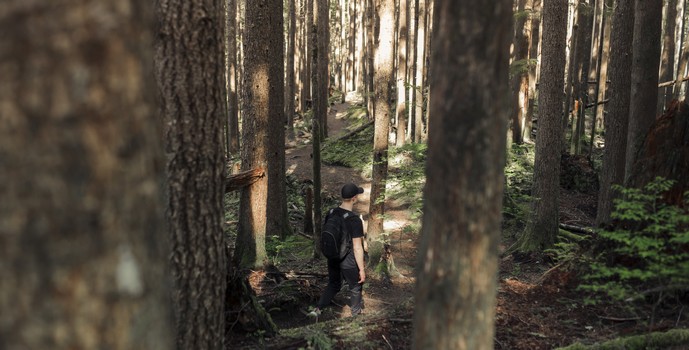- Representatives from the public and private sectors visited a property and company in Los Ríos, which operate under the highest standards in ecosystem services and products.
In the Los Ríos region, there are approximately 500,000 hectares of native forest with potential for productive management. This was one of the reasons why public and private experts visited a local property and company to share experiences and transform its use into a responsible and profitable practice.
The visit included over 70 participants from the Metropolitan, Biobío, La Araucanía, and Los Lagos regions. Among them were landowners, representatives from CONAF and INFOR, jointly convened by the Forest Stewardship Council (FSC), Aprobosque, Oikos, and Chilehaus—an alliance that has enabled the implementation of practices adding both environmental and economic value to forests.
This program, called the FSC Continuous Improvement Procedure, aims to support initiatives for the protection and conservation of forests and natural ecosystems. It operates in Colombia, Peru, and Bolivia and was established a year ago in Chile as a pilot in the Los Ríos region.
The first stop of the visit was the Santa Elena property in the Mariquina district, where an immersion session took place on a dairy farm. The owner took on the challenge of responsibly managing a portion of their native forest under high standards of use and protection.
The Executive Director of FSC Chile, Regina Massai, emphasized the importance of fieldwork and building trust among small landowners. "This particular case shows us how to move forward with concrete practices that add environmental and economic value to the forest, and it will be an opportunity to replicate this initiative further."
Meanwhile, the president of Aprobosque, José Carter, stated, "When we turn our forests into schools, we are making a significant contribution. The key is finding how to converge these pillars so that landowners see that things can be done right with these criteria and that these sustainable practices are adopted and maintained."
The program has established various alliances to reinforce the responsible management of areas with natural ecosystems and build capacities with technical support. A group of landowners committed to conservation has been formed, meeting basic requirements to certify their good practices, implementing low-intensity management in forests or natural ecosystems in the region.
The regional director of CONAF, Arnoldo Shibar, noted that "experiences like these are very meaningful because they open a range of options, mainly related to the management of the region's native forests, and show how small and medium landowners are working sustainably, seeking productive development while also ensuring conservation."
Jan Köster, manager of the consulting firm OIKOS, responsible for management actions on the property, explained that restoring degraded native forests can be both a challenge and an economic opportunity. "Today, we visited an exercise in productive sustainable management aimed at regenerating and restoring the forest. If we can care for it while also making it productive—helping pay the bills—it’s the best of both worlds."
Techniques and Knowledge
The field session concluded with a visit to the Chilehaus plant in Paillaco, a family-owned company that has established Chile’s only manufacturing plant for wood parts and components for industrialized carpentry, using high-level technologies imported from Germany.
The Chilehaus team shared their knowledge and techniques for wood construction with visitors, focusing on enhancing attributes and characteristics in a controlled environment, with sustainable and specialized production processes, aiming for social responsibility, sustainability, and a circular economy.
Its manager, Carlos Aravena, reinforced the vision of their venture, which revalues traditional carpentry with modern technology. "We want to take Paillaco’s woodwork to the world, revaluing craftsmanship and technology use, with educational and technical processes to accelerate housing construction and efficiently meet demand."
The manager of the Strategic Program for Industrialized Wood Housing Construction in Biobío stated, "Wood is the only potentially carbon-neutral material because it sequesters more than it emits and meets all the requirements for more sustainable construction. We must understand that we need more trees, of any species. Additionally, we must ensure native forests become more vigorous and are not lost, which requires systemic economic incentives so it’s not a burden but something citizens aspire to."
Currently, the country’s goal is to manage and restore 200,000 hectares of native forest, create 200,000 hectares of new forests, and reduce emissions from the forestry sector due to degradation and deforestation of native forests by 25% by 2030.
In this scenario, public policies promoting the forestry sector have been asymmetrical regarding incentives for productive native forest management.
Therefore, FSC Chile is developing the Sustainable Management and Valorization of Native Forests project, aiming to support small and medium producers of goods and services from native forests through value chain demand, balancing economic development with environmental conservation and ensuring the benefits of sustainable forest management reach all sector stakeholders.
The manager of Madera21 at Corma, Carolina Hurtado, expressed that "the entire session was a very positive experience. We realized how forest management on small properties can be sustainable, efficient, and beneficial for owners. Additionally, seeing how in small towns across our country, we can find people with extensive knowledge and skills in wood construction—which will improve the quality of life for residents—was inspiring."







Comentarios (0)
No hay comentarios aún. ¡Sé el primero en comentar!
Deja un comentario